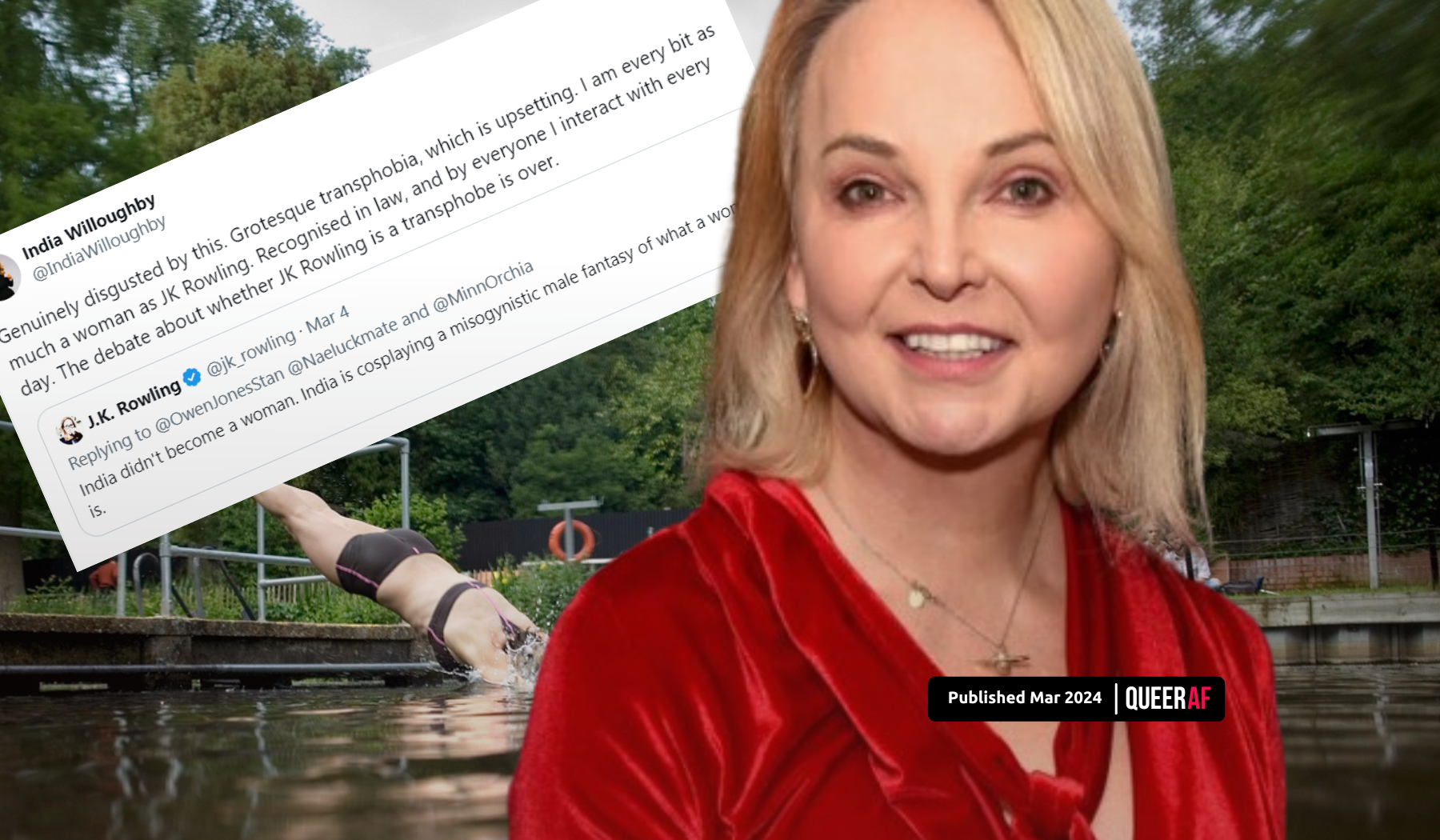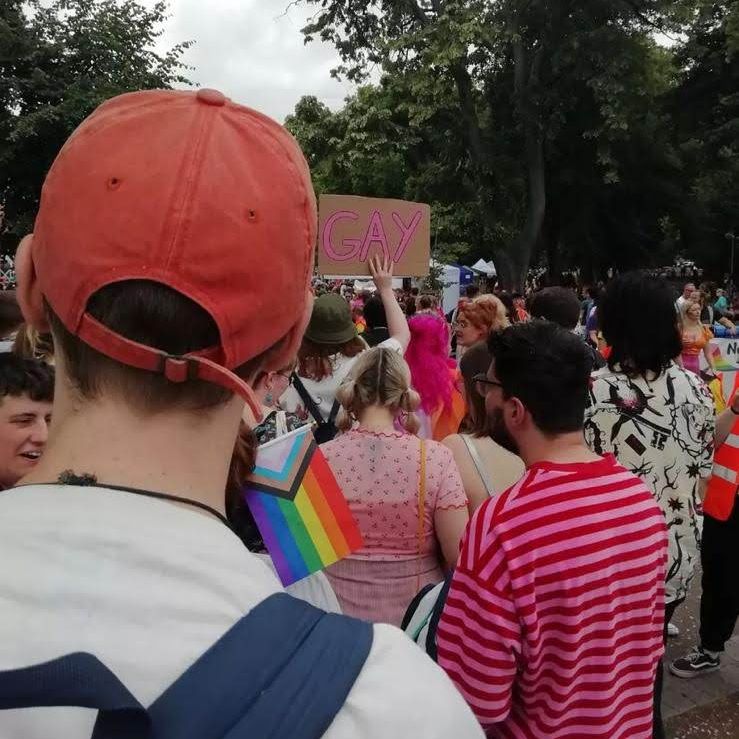TL;DR: In another anti-trans tirade on social media, JK Rowling stepped up her transphobic rhetoric in comments about broadcaster India Willoughby. Meanwhile, so-called ‘gender critical’ activists failed an aggressive attempt to ban trans women from an outdoor swimming pool. Both stories show that the anti-trans lobby is losing its respectability.
“The mask is off.” That’s how trans newsreader, journalist and Loose Women host India Willoughby described comments made by JK Rowling this week in a series of events that have revealed a lot about the intentions of so-called ‘gender critical’ activists.
Willoughby was speaking in an interview with Caolan Robertson for Byline TV. In the 24-minute video, she discussed her experiences of transphobia online, her attempts to reconcile with Rowling in the past – and revealed that she had reported Rowling to Northumbria Police concerning this week’s comments - Byline TV
On Monday, responding to a X, formerly known as Twitter, user who referred to Willoughby, Rowling repeatedly misgendered the broadcaster and described her as “narcissistic” and “misogynistic”. Willoughby called out the comments in a Tweet, describing them as “Grotesque transphobia” and saying, “The debate about whether JK Rowling is a transphobe is over” - Independent
Elsewhere, a small minority of Kenwood Ladies' Pond Association members brought a motion to a meeting last weekend, aiming to exclude trans women from the Hampstead Heath Swimming Ponds. The motion was resoundingly defeated when a large majority of the 200+ members present, mostly cis women, voted against it - BBC
Is JK Rowling an extremist?
In the Byline TV interview, Willoughby said, “JK Rowling is probably the most radicalised person in internet history [...] I would class her as an extremist”.
The topic of extremism has been widely discussed this week, following a speech made by Prime Minister Rishi Sunak last Friday in response to George Galloway winning the Rochdale byelection - YouTube
Last November, it was reported that Communities Minister Michael Gove was working on plans that would allow public bodies to cut off links to “extremist” groups. The move is reportedly intended to specifically target groups such as Palestine Action that have been protesting about the ongoing attacks on Gaza - Telegraph
However, the plans, due to be unveiled next week, face criticism from within Gove and Sunak’s party. Rightwing Tory MP Miriam Cates has expressed concern that her own anti-trans beliefs could be classified as extremist views while admitting “I regularly call trans rights activists extremists” - Guardian
The last agreed-upon governmental definition of extremism is from 2011, set out in the controversial Prevent strategy. It states that extremism means “active opposition” to “fundamental British values” such as “individual liberty” and “mutual respect” - gov.uk
The government hopes to develop a new definition of extremism that serves its political aims. But their supposed allies among the so-called ‘gender critical’ lobby, including those like Rowling, whose comments seem to express opposition to the individual liberty of trans people, may be caught in the crossfire.
A bad couple of weeks for the anti-trans lobby
Last week, Sex Matters director Helen Joyce admitted to reading erotic Harry Potter fanfiction on a train, supposedly for research purposes - QueerAF
On Sunday, a so-called ‘gender critical’ activist disrupted a meeting about swimming pools by loudly accusing members of being culpable for hypothetical acts of sexual violence - Ugla Stefanía via X
Now, JK Rowling is being reported to police for comments that, as Willoughby contends, could be classified as a “hate crime” - Variety
It’s not a good look.
These two weeks have shown, clearer than ever, that the beliefs of Rowling and her allies are rooted in transphobia, not in concern for women’s rights as they claim.
Nonetheless, they still wield a lot of power and influence in society. Maya Forstater, Joyce’s colleague at Sex Matters, was praised by former Prime Minister Liz Truss this week. Just two weeks ago, Warner Bros CEO David Zaslav confirmed that Max is in talks with Rowling about a TV adaptation of the book series that could last up to a decade - The Wrap
That level of financial and reputational power makes comments like those Rowling made this week very dangerous. Asked by Robertson about her experience of harassment on X this week, Willoughby described it as “a living hell” and a “maelstrom of hate”. On several occasions, she has highlighted the dangers of stochastic terrorism – the public demonisation of a person or group resulting in the incitement of violence against them – including in a tweet she made this Monday - Twitter
In a week that saw the killer of trans woman Dime Doe convicted of a hate crime based on gender identity, the first ruling of its kind in the states, we do not need reminding of the dangers trans people face in a world that is saturated with comments like those Rowling made on Monday - PinkNews
They may have power, but this week’s events make clear that these so-called ‘gender critical’ voices do not represent popular opinion among women. Stonewall research has shown that “Narratives that are hostile to trans people or challenge their existence don’t resonate with most women.” The Hampstead Swimming Pond meeting results are the perfect example of that in practice.
Step by step, week by week, so-called ‘gender critical’ campaigners are losing their respectability. The bravery of people like India Willoughby is vital to the struggle for a more accepting society.

Reporting on the actions of transphobes is just the first step.
When powerful people say dangerous and derogatory things, it's crucial that they're held accountable.
After all, that's what a functioning media is supposed to do - hold power to account.
Many parts of the media are failing at that, especially when it comes to those who spread transphobic and queerphobic hatred.
But we're doing our part to fill the role that effective journalism should. And we're not alone.
In the two years that I've worked on QueerAF, it's been inspiring to see a number of other queer journalism projects get up and running in the UK. We weren't the first, and we certainly won't be the last.
Like us, those projects inspire more queer voices to get into journalism every week, to report on stories about us from our perspectives.
We need your support to further our unique approach to queer journalism - telling stories because they count, not for clicks - while skilling up a new generation of queer creatives.
If you can, consider supporting what respected Trans+ journalist and QueerAF contributor Jess O'Thomson describes as "one of the best publications doing queer journalism I know of".
Become a QueerAF member from just £4 a month.











